 Libri di Catherine Malabou su Unilibro.it
)
Libri di Catherine Malabou su Unilibro.it
)
|
|
2025 |
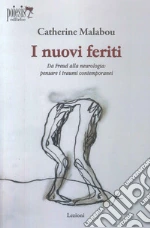 Title :
I nuovi feriti. Da Freud alla neurologia: pensare i traumi contemporanei
Title :
I nuovi feriti. Da Freud alla neurologia: pensare i traumi contemporaneiAuthor: Malabou Catherine Publisher: Poiesis (Alberobello) A partire dal desiderio di proclamare la necessità di un "totale rimaneggiamento teorico della psicopatologia", Catherine Malabou, consapevole che tale operazione implichi un riorientamento della clinica e una revisione filosofica delle basi stesse di questa, propone un confronto tra "sessualità" e "cerebralità", rimettendo in questione la definizione freudiana dell'evento psichico e, soprattutto, affermando che una nuova teoria della causalità psichica debba essere elaborata. Quello che l'autrice intende è aprire una frontiera, troppo a lungo preclusa, con, da un lato, la concezione psicanalitica dell'evento psichico come "saldatura" dei caratteri endogeni ed esogeni degli accidenti, e, dall'altro, dell'aspetto brutale, contingente, completamente esterno e impossibile da anticipare della lesione cerebrale. Un desiderio di far passare una linea di condivisione e di negoziazione tra l'affermazione che ogni effrazione traumatica scatena un conflitto interno e s'iscrive nel percorso di una storia o di un destino individuali, dall'altra parte la rivendicazione del carattere profondamente arbitrario e refrattario di ogni ermeneutica dell'incidente cerebrale. Testimoni di questo discorso sono proprio i "nuovi feriti" - malati di Alzheimer e altri cerebrolesi, ma anche i traumatizzati di guerra, le vittime di abusi sessuali o di catastrofi naturali, gli esclusi sociali. Tutti questi soggetti, nelle reazioni ai colpi subiti, rivelano l'esistenza di una diserzione emozionale e affettiva, una sofferenza che si manifesta il più delle volte come un'indifferenza alla sofferenza. Quello € 22,00
Scontato: € 20,90
|
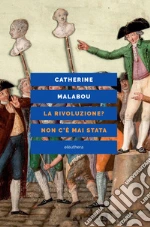 Title :
La rivoluzione? Non c'è mai stata
Title :
La rivoluzione? Non c'è mai stataAuthor: Malabou Catherine Publisher: Elèuthera «La proprietà è il furto!» afferma Proudhon a pochi decenni dagli eventi rivoluzionari. Ma questa icastica affermazione è ampiamente travisata dai suoi contemporanei, a partire da Marx e dalla sua interpretazione economicista della storia. Il furto è infatti soprattutto un furto di memoria e di senso che cancella - occultandola sotto la retorica egualitaria - la nascita della proprietà privata e delle sue nuove tipologie di esclusi: quei proletari (all'interno) o quei colonizzati (all'esterno) che sono solo la versione moderna degli esclusi dell'Ancien Régime (i servi, ma non solo). In definitiva, il 1789 ha sì abolito i privilegi feudali, ma non la condizione servile, reintroducendo un sistema iniquo di distribuzione della ricchezza che ha vanificato una cruciale rivendicazione plebea: la fine delle disuguaglianze. E questo oblio sull'effettivo statuto del regime proprietario e delle dinamiche di dominio che lo sottendono si è non solo costantemente replicato, ma ha persino impregnato alcune critiche contemporanee della proprietà come la teoria dei beni comuni o gli stessi approcci decoloniali. € 20,00
Scontato: € 19,00
|
|
2024 |
 Title :
Al ladro! Anarchismo e filosofia
Title :
Al ladro! Anarchismo e filosofiaAuthor: Malabou Catherine Publisher: Elèuthera Perché mai alcuni dei maggiori filosofi radicali del Novecento hanno sviluppato concezioni forti di anarchia stando però ben attenti a non dichiararsi anarchici? Sembra quasi che l'anarchismo sia qualcosa di inconfessabile, qualcosa da occultare anche quando gli si ruba l'essenziale: la critica del dominio e della logica di governo. Ed è appunto questa dissociazione paradossale che viene qui analizzata, questa rimozione di quello che è il cuore della problematica anarchica: la praticabilità politica dell'assenza di governo. Sebbene questi filosofi abbiano tutti concorso a smantellare il paradigma archico, nondimeno hanno costruito il loro discorso come se fosse ex nihilo, celando il furto da cui deriva e rifiutandone gli esiti. Insomma, destituzione del paradigma archico, sì, decostruzione del dominio, sì, ma effettiva possibilità che gli uomini possano vivere senza essere governati né governare, no. Ma è appunto qui che il paradigma archico si riattiva, in questa incapacità di abbandonare l'ambito del governabile e di accedere invece allo spazio del non-governabile, ovvero del radicalmente altro, del radicalmente estraneo al rapporto comando/obbedienza. Come l'anarchismo, appunto. € 23,00
Scontato: € 21,85
|
|
|
2023 |
 Title :
La plasticità al tramonto della scrittura. Dialettica, distruzione, decostruzione
Title :
La plasticità al tramonto della scrittura. Dialettica, distruzione, decostruzioneAuthor: Malabou Catherine Publisher: Orthotes «La plasticità al tramonto della scrittura» è un manifesto filosofico e un'autobiografia intellettuale. Il saggio ha per tema uno dei motivi più importanti della filosofia europea negli ultimi cinquant'anni: la decostruzione. Catherine Malabou, con uno stile vibrante, cerca un'alternativa alle nozioni di traccia, resto, scrittura, sondando l'ipotesi di una "ri-materializzazione" e di una "ri-monetizzazione" del pensiero filosofico contemporaneo. Punto di approdo e di costante ripartenza è la comprensione post-metafisica della forma: una forma perennemente dislocata, forma "in sé" irriducibile alla presa del "per sé", che tuttavia è in grado di generare quel regime della visibilità e dell'evidenza che rappresenta una sorta di nuova infanzia della storia. Prova evidente e più generale di questo movimento è il profondo mutamento epistemologico contemporaneo, consistente nel passaggio da un'episteme del codice (dalla linguistica alla scrittura del dna) a un'episteme della messa in immagine (della quale le immagini della neurologia forniscono il paradigma maggiore). € 17,00
|
|
|
2022 |
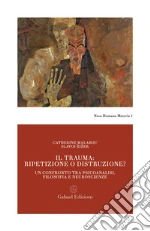 Title :
Il trauma: ripetizione o distruzione? Un confronto tra psicoanalisi, filosofia e neuroscienze
Title :
Il trauma: ripetizione o distruzione? Un confronto tra psicoanalisi, filosofia e neuroscienzeAuthor: Malabou Catherine; Zizek Slavoj Publisher: Galaad Edizioni Malati di Alzheimer e persone colpite da danni cerebrali irreversibili, ma anche individui segnati dalla guerra, vittime di abusi sessuali o di catastrofi naturali: esistenze nelle quali l'evento traumatico ha distrutto la vecchia identità per scolpirne una totalmente inedita, disertata, distaccata, indifferente, senza passato. Vicende soggettive, dunque, che smentirebbero clamorosamente il classico paradigma psicoanalitico in virtù del quale è identificabile come traumatico l'evento capace di riattivare la memoria di esperienze rimaste in attesa di significazione. Sin dalla loro comparsa le tesi esposte da Catherine Malabou nei Nuovi feriti non hanno mancato di far discutere gli studiosi - non soltanto gli analisti, ma anche i filosofi. Tra questi, Slavoj Zizek, uno dei primi ad aver colto la posta in gioco del libro: la tentazione ermeneutica è insita nel dispositivo stesso della psicoanalisi o è, appunto, una tentazione cui la psicoanalisi può e anzi deve resistere? Due interpretazioni del lascito freudiano chiaramente antitetiche, che trovano in Zizek e Malabou i protagonisti di una rigorosa discussione sulle figure del traumatismo contemporaneo. Il dibattito che ne deriva oppone due concezioni del trauma: da un lato, quella che lo pensa all'interno di una logica di senso rivelata dalla cura psicoanalitica; dall'altro, quella che lo fa coincidere con l'irruzione immotivata di un accidente la cui potenza cancella ogni traccia del passato. Un'alternativa che costringe il lettore a rinunciare a convinzioni consolidate e a inoltrarsi in un territorio teorico-clinico ancora € 14,00
Scontato: € 13,30
|
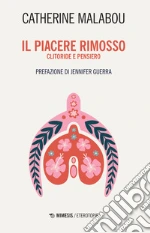 Title :
Il piacere rimosso. Clitoride e pensiero
Title :
Il piacere rimosso. Clitoride e pensieroAuthor: Malabou Catherine Publisher: Mimesis Cancellata dalla storia del sapere e dei corpi, oggi la clitoride è finalmente al centro di molte ricerche e pratiche. Anche all'interno del pensiero femminista il discorso si è trasformato e la clitoride è diventata una fonte di piacere che non appartiene più necessariamente alle donne, sovvertendo così una visione tradizionale della sessualità e del genere. Nonostante questa riscoperta, Catherine Malabou ci ricorda una ferita che tarda a sanarsi, violenze a cui ancora ci si trova a far fronte, dalle mutilazioni genitali al piacere negato a milioni di donne. La clitoride resta così il "luogo enigmatico del femminile" e di questo enigma l'autrice scrive con "tocchi" leggeri, in equilibrio tra apparizione e scomparsa, lasciando che sia l'organo stesso a parlare attraverso le voci di chi ne ha rivendicato l'esistenza. Prefazione Jennifer Guerra. € 14,00
Scontato: € 13,30
|
|
2021 |
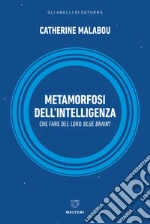 Title :
Metamorfosi dell'intelligenza. Che fare del nostro Blue Brain?
Title :
Metamorfosi dell'intelligenza. Che fare del nostro Blue Brain?Author: Malabou Catherine Publisher: Meltemi Non trovando una definizione per l'intelligenza, gli psicologi hanno cominciato a misurarla; dopo il fallimento dei test di misurazione, i biologi l'hanno allora cercata nei geni; ma, poiché la genetica restava silenziosa, è stato il cervello stesso con il suo sviluppo epigenetico a costruire il nuovo laboratorio della mente. Oggi, l'intelligenza autorizza la propria simulazione con i chip sinaptici: i programmi Human Brain e Blue Brain hanno mappato il cervello umano nella sua interezza, fino a produrre una coscienza artificiale in grado di auto-trasformarsi accedendo al proprio codice sorgente. Superando le posture tecnofobiche oggi diffuse, Metamorfosi dell'intelligenza ingaggia un dialogo tra autonomia e automatismo, mostrando il ruolo che il concetto di intelligenza può ancora giocare nel prolifico dibattito sulla democrazia sperimentale. € 15,00
Scontato: € 14,25
|
|
|
2020 |
 Title :
Divenire forma. Epigenesi e razionalità
Title :
Divenire forma. Epigenesi e razionalitàAuthor: Malabou Catherine Publisher: Meltemi La filosofia continentale contemporanea può congedarsi da Kant? Le strutture della conoscenza sono ormai sotto attacco. Fin dalla prima Critica le stesse erano irremovibili. Ora la finitudine, la fenomenicità e la sintesi a priori sembrano erose. La parola d'ordine dell'era postcritica è l'abbandono del trascendentale. Le recenti ricerche sullo sviluppo del cervello offrono un quadro tutt'altro che indiziario, contrapponendo l'idealismo trascendentale alla tesi dell'origine biologica dei processi mentali. Catherine Malabou, tra le più importanti filosofe contemporanee, elabora in modo sorprendente la risposta di Kant alla sua posterità. Fedele al proprio oggetto, il libro disvela la sua epigenesi, ovvero la crescita differenziata del suo embrione. Nella filosofia critica, e per coloro che la sanno interpretare, l'epigenesi costituisce la vita del trascendentale e la promessa della sua trasformazione. € 22,00
Scontato: € 20,90
|
|
|
1919 |
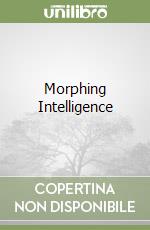 Title :
Morphing Intelligence
Title :
Morphing IntelligenceAuthor: Catherine Malabou Publisher: Columbia University Press € 29,80
|
|
|
2019 |
 Title :
Avvenire e dolore trascendentale
Title :
Avvenire e dolore trascendentaleAuthor: Malabou Catherine; Alessandrini N. (cur.) Publisher: Mimesis Tra i libri più importanti usciti sull'argomento negli ultimi trent'anni, quest'opera risulta una lettura essenziale per tutti coloro che sono interessati alla filosofia continentale contemporanea. Da un'assenza di pensiero dell'avvenire nella filosofia di Hegel risulterebbe un'assenza di avvenire della stessa filosofia hegeliana. Catherine Malabou, allieva di Jacques Derrida, con la sua riflessione filosofica ha smentito questo assunto, lavorando sul concetto di plasticità e mostrando come esso descriva al meglio la teoria della temporalità sviluppata dal filosofo tedesco. € 12,00
Scontato: € 11,40
|
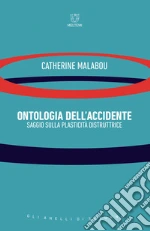 Title :
Ontologia dell'accidente. Saggio sulla plasticità distruttrice
Title :
Ontologia dell'accidente. Saggio sulla plasticità distruttriceAuthor: Malabou Catherine Publisher: Meltemi In conseguenza di gravi traumi, talvolta per un nonnulla, la storia di ognuno di noi può subire un radicale cambiamento: la vita che avevamo progettato per anni è costretta a una deviazione improvvisa e irreversibile. Dal trauma sorge una personalità nuova, senza precedenti. Una personalità nata da un incidente, nata per accidente. Il fortuito diviene così sostanziale e l'inaspettato s'inscrive nel nucleo più profondo del nostro essere. Affrontando con delicatezza il tema dell'impatto che i traumi psicofisici possono avere sulla nostra vita, Catherine Malabou intraprende un'avventura filosofica e letteraria in cui Spinoza, Deleuze e Freud incrociano Ovidio, Kafka, Proust e Duras, disegnando un'inedita ontologia fondata sul potere plastico della distruzione, sulla tendenza esplosiva che minaccia segretamente ognuno di noi. € 12,00
Scontato: € 11,40
|
|
1918 |
 Title :
Power of Gentleness
Title :
Power of GentlenessAuthor: Dufourmantelle Anne, Payne Katherine (TRN), Sallé Vincent (TRN), Malabou Catherine (FRW) Publisher: Fordham Univ Pr € 21,30
|
 Title :
Power of Gentleness
Title :
Power of GentlenessAuthor: Dufourmantelle Anne, Payne Katherine (TRN), Sallé Vincent (TRN), Malabou Catherine (FRW) Publisher: Fordham Univ Pr € 74,40
|
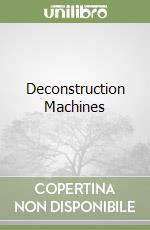 Title :
Deconstruction Machines
Title :
Deconstruction MachinesAuthor: Joque Justin, Malabou Catherine (FRW) Publisher: Univ of Minnesota Pr € 28,70
|
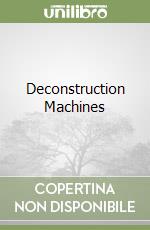 Title :
Deconstruction Machines
Title :
Deconstruction MachinesAuthor: Joque Justin, Malabou Catherine (FRW) Publisher: Univ of Minnesota Pr € 114,80
|
||
|
2017 |
 Title :
Che tu sia il mio corpo. Una lettura contemporanea della signoria e della servitù in Hegel
Title :
Che tu sia il mio corpo. Una lettura contemporanea della signoria e della servitù in HegelAuthor: Butler Judith; Malabou Catherine; Tusa G. (cur.) Publisher: Mimesis Scritta a quattro mani da Judith Butler e Catherine Malabou, quest'opera prende le mosse da una rilettura della dialettica servo-padrone formulata originariamente da Hegel in "Fenomenologia dello spirito". "Che tu sia il mio corpo" è il comando che il padrone impone allo schiavo. Malabou e Butler, da sempre attente studiose del corpo delle minoranze, sottolineano come questa ingiunzione sia di fatto impossibile, in quanto soggettività e corporeità non possono essere mai completamente disgiunte. Il distacco non può compiersi se non nella forma di un "attaccamento ostinato al distacco", un attaccamento sempre più ostinato e addirittura disperato. € 10,00
Scontato: € 9,50
|
|
|
1916 |
 Title :
Before Tomorrow
Title :
Before TomorrowAuthor: Malabou Catherine, Shread Carolyn (TRN) Publisher: Polity Pr € 68,30
|
 Title :
Before Tomorrow
Title :
Before TomorrowAuthor: Malabou Catherine, Shread Carolyn (TRN) Publisher: Polity Pr € 26,20
|
|
1913 |
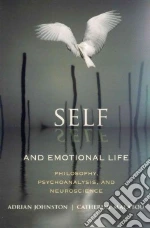 Title :
Self and Emotional Life
Title :
Self and Emotional LifeAuthor: Johnston Adrian, Malabou Catherine Publisher: Columbia Univ Pr Adrian Johnston and Catherine Malabou defy theoretical humanities' deeply-entrenched resistance to engagements with the life sciences. Rather than treat biology and its branches as hopelessly reductive and politically suspect, they view recent advances in neurobiology and its adjacent scientific fields as providing crucial catalysts to a radical rethinking of subjectivity. Merging three distinct disciplines -- European philosophy from Descartes to the present, Freudian-Lacanian psychoanalysis, and affective neuroscience -- Johnston and Malabou triangulate the emotional life of affective subjects as conceptualized in philosophy and psychoanalysis with neuroscience. Their experiments yield different outcomes. Johnston finds psychoanalysis and neurobiology have the potential to enrich each other, though affective neuroscience demands a reconsideration of whether affects can be unconscious. Investigating this vexed issue has profound implications for theoretical and practical analysis, as well as philosophical understandings of the emotions. Malabou believes scientific explorations of the brain seriously problematize established notions of affective subjectivity in Continental philosophy and Freudian-Lacanian analysis. She confronts philosophy and psychoanalysis with something neither field has seriously considered: the concept of wonder and the cold, disturbing visage of those who have been affected by disease or injury, such that they are no longer affected emotionally. At stake in this exchange are some of philosophy's most important claims concerning the relationship between the subjective mind and the objective body, the structures and dynamics of the unconscious dimensions of mental life, the role emotion plays in making us human, and the functional differences between philosophy and science. € 39,30
|
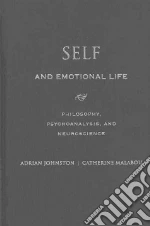 Title :
Self and Emotional Life
Title :
Self and Emotional LifeAuthor: Johnston Adrian, Malabou Catherine Publisher: Columbia Univ Pr Adrian Johnston and Catherine Malabou defy theoretical humanities' deeply-entrenched resistance to engagements with the life sciences. Rather than treat biology and its branches as hopelessly reductive and politically suspect, they view recent advances in neurobiology and its adjacent scientific fields as providing crucial catalysts to a radical rethinking of subjectivity. Merging three distinct disciplines -- European philosophy from Descartes to the present, Freudian-Lacanian psychoanalysis, and affective neuroscience -- Johnston and Malabou triangulate the emotional life of affective subjects as conceptualized in philosophy and psychoanalysis with neuroscience. Their experiments yield different outcomes. Johnston finds psychoanalysis and neurobiology have the potential to enrich each other, though affective neuroscience demands a reconsideration of whether affects can be unconscious. Investigating this vexed issue has profound implications for theoretical and practical analysis, as well as philosophical understandings of the emotions. Malabou believes scientific explorations of the brain seriously problematize established notions of affective subjectivity in Continental philosophy and Freudian-Lacanian analysis. She confronts philosophy and psychoanalysis with something neither field has seriously considered: the concept of wonder and the cold, disturbing visage of those who have been affected by disease or injury, such that they are no longer affected emotionally. At stake in this exchange are some of philosophy's most important claims concerning the relationship between the subjective mind and the objective body, the structures and dynamics of the unconscious dimensions of mental life, the role emotion plays in making us human, and the functional differences between philosophy and science. € 127,50
|
|
1912 |
 Title :
Ontology of the Accident
Title :
Ontology of the AccidentAuthor: Malabou Catherine, Shread Carolyn (TRN) Publisher: Polity Pr In the usual order of things, lives run their course and eventually one becomes who one is. Bodily and psychic transformations do nothing but reinforce the permanence of identity. But as a result of serious trauma, or sometimes for no reason at all, a subject’s history splits and a new, unprecedented persona comes to live with the former person - an unrecognizable persona whose present comes from no past and whose future harbors nothing to come; an existential improvisation, a form born of the accident and by accident. Out of a deep cut opened in a biography, a new being comes into the world for a second time. What is this form? A face? A psychological profile? What ontology can it account for, if ontology has always been attached to the essential, forever blind to the aléa of transformations? What history of being can the plastic power of destruction explain? What can it tell us about the explosive tendency of existence that secretly threatens each one of us? Continuing her reflections on destructive plasticity, split identities and the psychic consequences experienced by those who have suffered brain injury or have been traumatized by war and other catastrophes, Catherine Malabou invites us to join her in a philosophic and literary adventure in which Spinoza, Deleuze and Freud cross paths with Proust and Duras. € 13,10
|
 Title :
The Ontology of the Accident
Title :
The Ontology of the AccidentAuthor: Malabou Catherine, Shread Carolyn (TRN) Publisher: Polity Pr In the usual order of things, lives run their course and eventually one becomes who one is. Bodily and psychic transformations do nothing but reinforce the permanence of identity. But as a result of serious trauma, or sometimes for no reason at all, a subject’s history splits and a new, unprecedented persona comes to live with the former person - an unrecognizable persona whose present comes from no past and whose future harbors nothing to come; an existential improvisation, a form born of the accident and by accident. Out of a deep cut opened in a biography, a new being comes into the world for a second time. What is this form? A face? A psychological profile? What ontology can it account for, if ontology has always been attached to the essential, forever blind to the aléa of transformations? What history of being can the plastic power of destruction explain? What can it tell us about the explosive tendency of existence that secretly threatens each one of us? Continuing her reflections on destructive plasticity, split identities and the psychic consequences experienced by those who have suffered brain injury or have been traumatized by war and other catastrophes, Catherine Malabou invites us to join her in a philosophic and literary adventure in which Spinoza, Deleuze and Freud cross paths with Proust and Duras. € 43,90
|
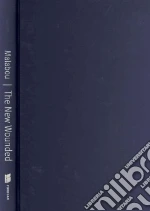 Title :
The New Wounded
Title :
The New WoundedAuthor: Malabou Catherine, Miller Steven (TRN) Publisher: Fordham Univ Pr This book employs a philosophical approach to the "new wounded" (brain lesion patients) to stage a confrontation between psychoanalysis and contemporary neurobiology, focused on the issue of trauma and psychic wounds. It thereby reevaluates the brain as an organ that is not separated from psychic life but rather at its center. The "new wounded" suffer from psychic wounds that traditional psychoanalysis, with its emphasis on the psyche's need to integrate events into its own history, cannot understand or cure. They are victims of various cerebral lesions or attacks, including degenerative brain diseases such as Parkinson's and Alzheimer's. Changes caused by cerebral lesions frequently manifest themselves as an unprecedented metamorphosis in the patient's identity. A person with Alzheimer's disease, for example, is not--or not only--someone who has "changed" or been "modified" but rather a subject who has become someone else. The behavior of subjects who are victims of "sociopolitical traumas," such as abuse, war, terrorist attacks, or sexual assaults, displays striking resemblances to that of subjects who have suffered brain damage. Thus today the border separating organic trauma and sociopolitical trauma is increasingly porous. Effacing the limits that separate "neurobiology" from "sociopathy," brain damage tends also to blur the boundaries between history and nature. At the same time, it reveals that political oppression today assumes the guise of a traumatic blow stripped of all justification. We are thus dealing with a strange mixture of nature and politics, in which politics takes on the appearance of nature, and nature disappears in order to assume the mask of politics. € 111,60
|
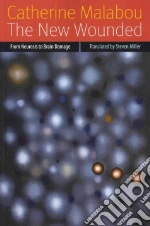 Title :
The New Wounded
Title :
The New WoundedAuthor: Malabou Catherine, Miller Steven (TRN) Publisher: Fordham Univ Pr This book employs a philosophical approach to the "new wounded" (brain lesion patients) to stage a confrontation between psychoanalysis and contemporary neurobiology, focused on the issue of trauma and psychic wounds. It thereby reevaluates the brain as an organ that is not separated from psychic life but rather at its center. The "new wounded" suffer from psychic wounds that traditional psychoanalysis, with its emphasis on the psyche's need to integrate events into its own history, cannot understand or cure. They are victims of various cerebral lesions or attacks, including degenerative brain diseases such as Parkinson's and Alzheimer's. Changes caused by cerebral lesions frequently manifest themselves as an unprecedented metamorphosis in the patient's identity. A person with Alzheimer's disease, for example, is not--or not only--someone who has "changed" or been "modified" but rather a subject who has become someone else. The behavior of subjects who are victims of "sociopolitical traumas," such as abuse, war, terrorist attacks, or sexual assaults, displays striking resemblances to that of subjects who have suffered brain damage. Thus today the border separating organic trauma and sociopolitical trauma is increasingly porous. Effacing the limits that separate "neurobiology" from "sociopathy," brain damage tends also to blur the boundaries between history and nature. At the same time, it reveals that political oppression today assumes the guise of a traumatic blow stripped of all justification. We are thus dealing with a strange mixture of nature and politics, in which politics takes on the appearance of nature, and nature disappears in order to assume the mask of politics. € 39,30
|
||
|
1911 |
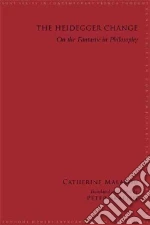 Title :
The Heidegger Change
Title :
The Heidegger ChangeAuthor: Malabou Catherine, Skafish Peter (TRN) Publisher: State Univ of New York Pr Elaborates the author’s conception of plasticity by proposing a new way of thinking through Heidegger’s writings on change. € 60,20
|
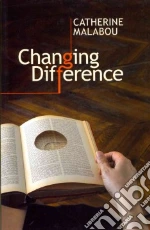 Title :
Changing Difference
Title :
Changing DifferenceAuthor: Malabou Catherine, Shread Carolyn (TRN) Publisher: Polity Pr Translated by CAROLYN SHREAD In the post-feminist age the fact that 'woman' finds herself deprived of her 'essence' only confirms, paradoxically, a very ancient state of affairs: 'woman' has never been able to define herself in any other way than in terms of the violence done to her. Violence alone confers her being - whether it is domestic and social violence or theoretical violence. The critique of 'essentialism' (i.e. there is no specifically feminine essence) proposed by both gender theory and deconstruction is just one more twist in the ontological negation of the feminine. Contrary to all expectations, however, this ever more radical hollowing out of woman within intellectual movements supposed to protect her, this assimilation of woman to a 'being nothing', clears the way for a new beginning. Let us now assume the thought of 'woman' as an empty but resistant essence, an essence that is resistant precisely because it is empty, a resistance that strikes down the impossibility of its own disappearance once and for all. To ask what remains of woman after the sacrifice of her being is to signal a new era in the feminist struggle, changing the terms of the battle to go beyond both essentialism and anti-essentialism. In this path-breaking work Catherine Malabou begins with philosophy, asking: what is the life of a woman philosopher? € 20,50
|
|
2008 |
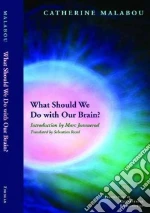 Title :
What Should We Do with Our Brain?
Title :
What Should We Do with Our Brain?Author: Malabou Catherine, Rand Sebastian (TRN), Jeannerod Marc (INT) Publisher: Fordham Univ Pr Recent neuroscience, in replacing the old model of the brain as a single centralized source of control, has emphasized “plasticity,” the quality by which our brains develop and change throughout the course of our lives. Our brains exist as historical products, developing in interaction with themselves and with their surroundings. Hence there is a thin line between the organization of the nervous system and the political and social organization that both conditions and is conditioned by human experience. Looking carefully at contemporary neuroscience, it is hard not to notice that the new way of talking about the brain mirrors the management discourse of the neo-liberal capitalist world in which we now live, with its talk of decentralization, networks, and flexibility. Consciously or unconsciously, science cannot but echo the world in which it takes place. In the neo-liberal world, “plasticity” can be equated with “flexibility”—a term that has become a buzzword in economics and management theory. The plastic brain would thus represent just another style of power, which, although less centralized, is still a means of control. In this book, Catherine Malabou develops a second, more radical meaning for plasticity. Not only does plasticity allow our brains to adapt to existing circumstances, it opens a margin of freedom to intervene, to change those very circumstances. Such an understanding opens up a newly transformative aspect of the neurosciences. In insisting on this proximity between the neurosciences and the social sciences, Malabou applies to the brain Marx's well-known phrase about history: people make their own brains, but they do not know it. This book is a summons to such knowledge. € 28,70
|
|
|
2007 |
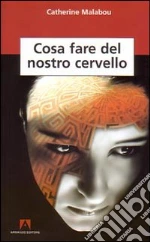 Title :
Cosa fare del nostro cervello
Title :
Cosa fare del nostro cervelloAuthor: Malabou Catherine Publisher: Armando Editore Cosa fare del nostro cervello non è una domanda riservata ai filosofi, agli scienziati o ai politici, è una domanda che riguarda tutti e che dovrebbe permetterci di comprendere perché, nonostante esso sia plastico, libero, ci ritroviamo ancora e ovunque in "schiavitù", facendo del "nostro cervello" il servitore biologico dell'adattabilità, della polivalenza e della docilità imposte dalle nuove leggi dell'economia mondiale. La domanda che ci pone l'autrice in questo saggio è la seguente: come fare affinché la coscienza del cervello non coincida puramente e semplicemente con lo spirito del capitalismo? € 12,00
Scontato: € 11,40
|
|
|
2004 |
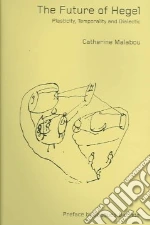 Title :
The Future of Hegel
Title :
The Future of HegelAuthor: Malabou Catherine, During Lisabeth (TRN) Publisher: Routledge This book is one of the most important recent books on Hegel, a philosopher who has had a crucial impact on the shape of continental philosophy. Published here in English for the first time, it includes a substantial preface by Jacques Derrida in which he explores the themes and conclusions of Malabou's book. The Future of Hegel: Plasticity, Temporality and Dialectic restores Hegel's rich and complex concepts of time and temporality to contemporary philosophy. It examines his concept of time, relating it to perennial topics in philosophy such as substance, accident and the identity of the subject. Catherine Malabou's also contrasts her account of Hegelian temporality with the interpretation given by Heidegger in Being and Time, arguing that it is the concept of 'plasticity' that best describes Hegel's theory of temporality. The future is understood not simply as a moment in time, but as something malleable and constantly open to change through our interpretation. € 45,80
|
|